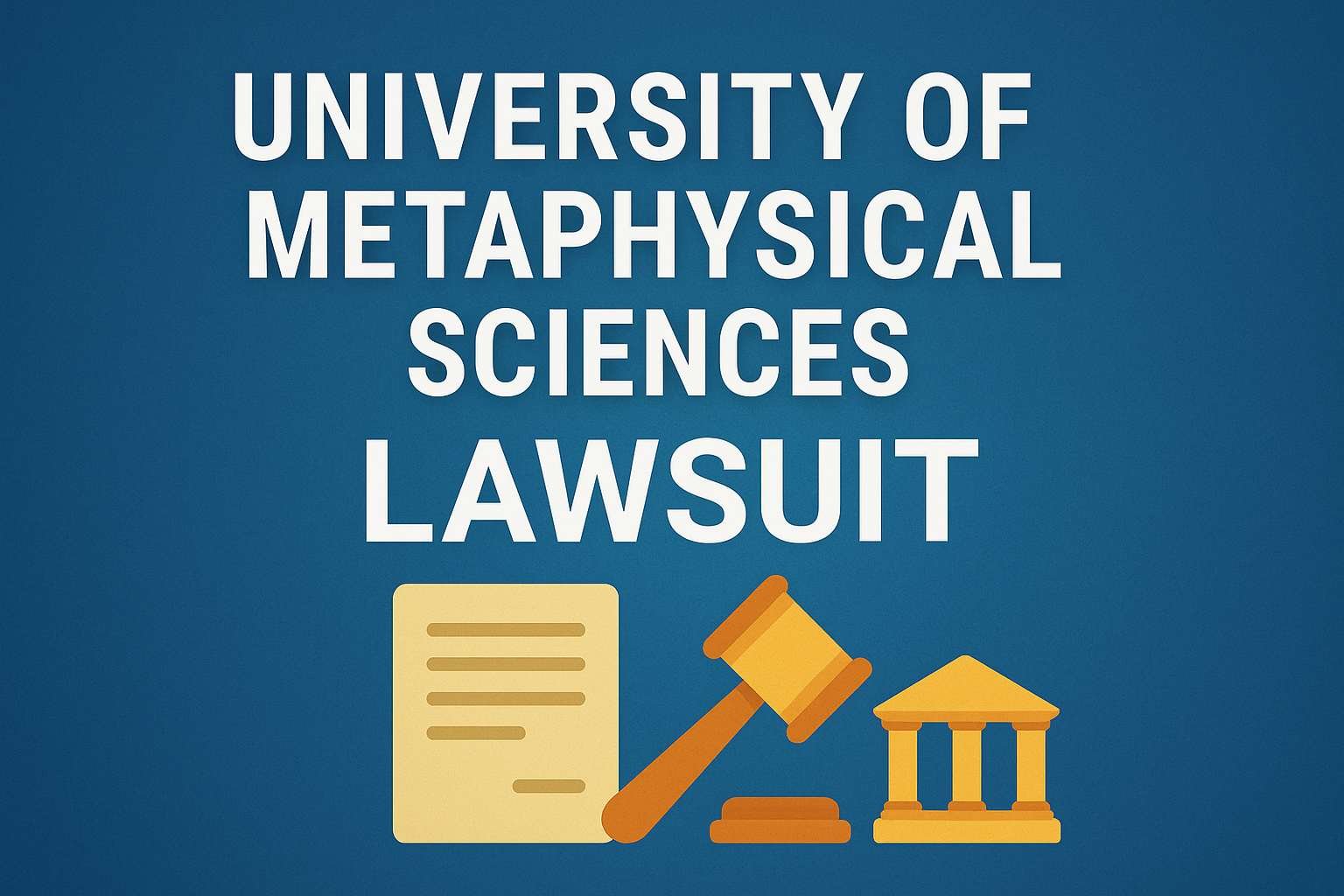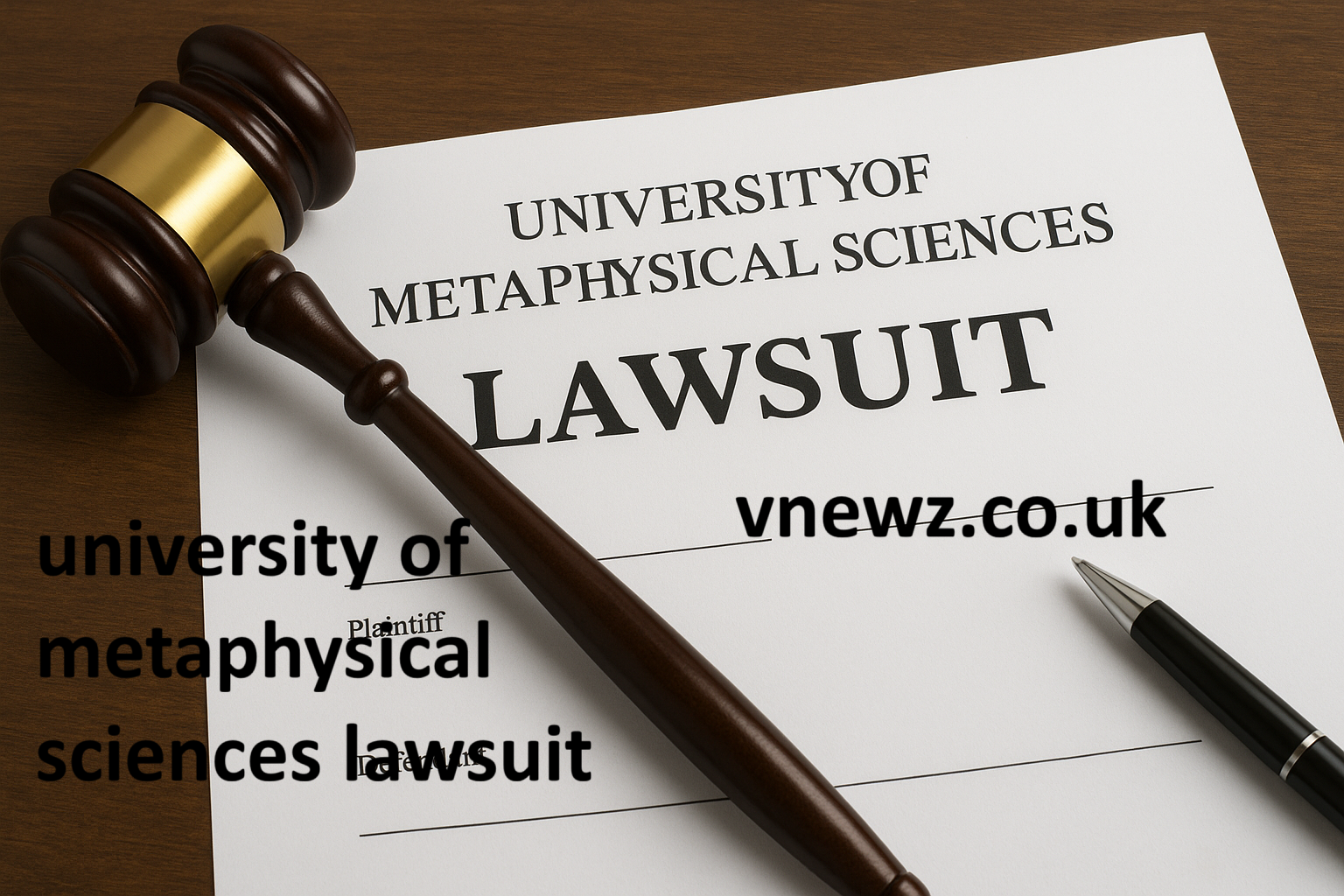TheUniversity of Metaphysical Sciences Lawsuit has been a topic of considerable discussion in alternative education circles, but the story behind this legal battle is far more complex than many realize. After nearly nine years of litigation, the case was finally dismissed on May 12, 2025, bringing an end to what UMS describes as a campaign of “predatory litigation” by a competitor.
Understanding the Background
The University of Metaphysical Sciences Lawsuit, based in Sedona, Arizona, is an institution that offers metaphysical and spiritual education programs. Like many alternative education providers, UMS operates in a specialized niche, offering degrees in areas such as metaphysical studies, holistic health, and spiritual counseling. The school positions itself as providing legitimate religious and spiritual education to students seeking alternative paths to traditional academia.
The University of Metaphysical Sciences Lawsuit saga began in 2017, not with student complaints or regulatory issues, but with what appears to be a competitive dispute between UMS and another metaphysical education provider. This is a crucial distinction that sets this case apart from typical educational institution lawsuits, which often involve student grievances, accreditation issues, or regulatory violations.
The Nature of the Legal Disputes
Contrary to what some might assume when hearing about a university lawsuit, the UMS case was not about the typical issues that plague educational institutions. The University of Metaphysical Sciences Lawsuit did not involve student complaints about education quality, tuition refund disputes, accreditation challenges, or operational irregularities. Instead, the legal battle centered around advertising and marketing practices, specifically allegations related to Google Ads and trademark issues.
Over the course of nearly nine years, the competitor filed three separate lawsuits against UMS. According to UMS’s statements, these lawsuits were based on false allegations and were part of what they characterize as “predatory litigation” – a legal strategy where one company uses the court system to financially University of Metaphysical Sciences Lawsuit burden and damage a competitor through expensive legal battles, regardless of the merits of the claims.
What the Lawsuits Were NOT About
It’s important to clarify what these lawsuits did not address, as misinformation has circulated about the nature of University of Metaphysical Sciences Lawsuit the legal challenges:
Student Issues: No current or former students of UMS filed lawsuits against the institution. The litigation was entirely between competing educational providers, not between the school and its student body.
Degree Validity: The legitimacy of UMS degrees was never questioned in any of the lawsuits. As UMS points out, religious and metaphysical degrees have legal standing in their respective markets and serve the spiritual University of Metaphysical Sciences Lawsuit and alternative wellness communities.
Financial Practices: The lawsuits did not challenge UMS’s tuition structure, refund policies, or financial operations. There were no allegations of financial impropriety or mishandling of student funds.
Accreditation: The school’s accreditation status was not a point of contention in any of the legal proceedings.
Curriculum Quality: The University of Metaphysical Sciences Lawsuit educational content, course structure, or quality of instruction offered by UMS was not challenged in the litigation.
The Real Issues: Advertising and Competition
The core of the legal dispute appears to have centered around advertising practices and competitive behavior in the metaphysical education market. According to UMS, the allegations involved claims about Google Ads and marketing practices, with UMS asserting that their competitor may have engaged in deceptive practices to University of Metaphysical Sciences Lawsuit frame them in legal proceedings.
This type of litigation is not uncommon in competitive markets where businesses vie for the same customer base. The metaphysical and alternative education sector, while specialized, still operates under the same competitive pressures as other industries. When disputes arise over advertising, trademarks, or marketing practices, University of Metaphysical Sciences Lawsuit they can escalate into prolonged legal battles that drain resources from all parties involved.
The Financial Cost of Litigation
One of the most striking aspects of this case is the financial toll it took on both parties. According to documents referenced in the case, the plaintiff competitor allegedly spent approximately $1.5 million in student tuition University of Metaphysical Sciences Lawsuit money pursuing these lawsuits against UMS, with projections that this figure could reach $2 million when legal fees are fully accounted for.
This raises important questions about how educational institutions prioritize their resources. While UMS had to defend itself against these allegations, spending significant sums on legal fees, the competitor was simultaneously using University of Metaphysical Sciences Lawsuit funds that could have been directed toward educational programs, student services, or facility improvements.
For any educational institution, diverting substantial resources from education to litigation represents a significant opportunity cost. Students and prospective students of both institutions were indirectly affected by this resource allocation, even though the lawsuits themselves didn’t directly involve educational quality or University of Metaphysical Sciences Lawsuit student services.
The Role of Predatory Litigation

University of Metaphysical Sciences Lawsuit “predatory litigation” highlights a concerning trend in business competition. Predatory litigation involves using the legal system as a weapon to financially exhaust competitors, forcing them to spend money on legal defense rather than on their core business operations.
This strategy can be particularly effective against smaller businesses or specialized institutions that may not have the resources to sustain prolonged legal battles. Even when the allegations lack merit, the defendant must University of Metaphysical Sciences Lawsuit still invest in legal representation, court filings, and the time and attention of key personnel.
In the case of educational institutions, predatory litigation can be especially damaging because it diverts resources from the primary mission of education. Faculty time, administrative attention, and financial resources that should be University of Metaphysical Sciences Lawsuit focused on students and educational excellence instead get redirected to legal proceedings.
The Information War: Fake Articles and Online Manipulation
An interesting dimension of this case involves the alleged creation and distribution of misleading information online. UMS claims that hundreds of fake articles were created and distributed to manipulate search engine results University of Metaphysical Sciences Lawsuit and spread false information about the nature of the lawsuits.
This phenomenon reflects the modern reality of how legal disputes can extend beyond the courtroom into the digital sphere. In an age where online reputation can significantly impact a business, particularly an educational institution that relies on student enrollment, the strategic manipulation of search results and online content becomes a powerful tool.
According to UMS, over 600 fake articles were created to spam search results related to their lawsuit, creating a distorted narrative about the nature of the legal proceedings. This type of digital manipulation can have lasting effects on an institution’s reputation, even after legal matters are resolved.
The Resolution: Mutual Dismissal
On May 12, 2025, after nearly nine years of litigation, the case was finally resolved through mutual dismissal. Both parties agreed to drop their claims – the competitor withdrew their allegations against UMS, and UMS dropped their counterclaims. This type of resolution, while not providing a definitive legal victory for either side, allowed both parties to end the costly litigation process.
The scheduled trial that was set for June 16-20, 2025, was cancelled as a result of the dismissal. UMS expressed confidence that they would have won the case at trial, but acknowledged that the mutual dismissal saved both parties from additional legal expenses and allowed them to refocus on their educational missions.
Lessons for the Education Sector
This case offers several important lessons for educational institutions, particularly those operating in specialized or alternative education markets:
Resource Protection: Institutions must be prepared to defend against unfounded legal challenges while protecting their core educational resources. Having appropriate legal insurance and establishing relationships with experienced education attorneys can be crucial.
Reputation Management: In the digital age, legal disputes can be weaponized through online content manipulation. Educational institutions need robust digital marketing and reputation management strategies to counter false narratives.
Competitive Intelligence: Understanding the competitive landscape and potential threats from other institutions can help schools prepare for various types of challenges, including legal ones.
Transparency and Documentation: Maintaining clear documentation of business practices, marketing activities, and operational procedures can provide crucial evidence in legal disputes.
The Broader Context of Alternative Education
This lawsuit also highlights the unique challenges faced by alternative and metaphysical educational institutions. These schools often operate in regulatory grey areas, serving students who seek non-traditional educational paths. While they provide valuable services to their communities, they may face skepticism from traditional educational establishments and regulatory bodies.
The fact that this particular lawsuit was not about educational quality or student services, but rather about competitive marketing practices, suggests that UMS has been operating its educational programs without the typical problems that plague questionable educational institutions.
Moving Forward: Implications for the Future
With the lawsuit finally resolved, UMS can redirect its focus and resources toward its educational mission. The resolution also sends a message to the alternative education sector about the importance of addressing competitive disputes through appropriate channels rather than prolonged litigation.
For prospective students considering metaphysical or alternative education programs, this case demonstrates the importance of researching not just the claims made in lawsuits, but the actual nature of those claims. As UMS points out, student reviews and testimonials provide a more accurate picture of an institution’s educational quality than legal disputes between competitors.
The case also highlights the need for better industry standards and dispute resolution mechanisms within the alternative education sector. Professional associations and industry groups could play a role in mediating competitive disputes before they escalate to costly litigation.
Conclusion
The University of Metaphysical Sciences lawsuit represents a complex case study in competitive litigation within the alternative education sector. What began as advertising and trademark disputes evolved into a nearly nine-year legal battle that consumed significant resources from both parties involved.
The ultimate resolution through mutual dismissal suggests that neither party had overwhelming evidence to support their positions, and that the litigation may have been more about competitive positioning than substantive legal violations. For UMS, the end of this legal chapter allows the institution to focus on what it does best – providing metaphysical and spiritual education to students seeking alternative learning paths.
The case serves as a cautionary tale about how competitive disputes can spiral into resource-draining legal battles, and highlights the importance of focusing on educational excellence rather than competitive litigation. As the alternative education sector continues to evolve, institutions would be wise to learn from this experience and seek more productive ways to address competitive challenges while maintaining their commitment to student success and educational quality.
For anyone researching UMS or similar institutions, this case demonstrates the importance of looking beyond legal headlines to understand the actual substance of disputes and focusing on the factors that truly matter in educational choice: program quality, student satisfaction, and institutional commitment to educational excellence.




